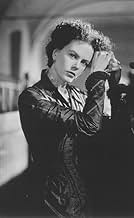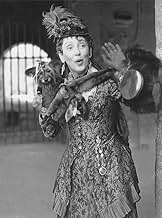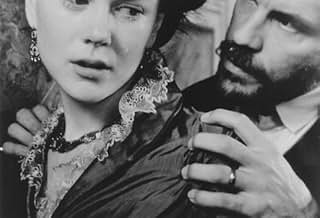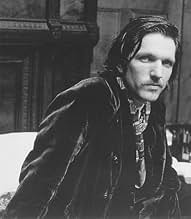AVALIAÇÃO DA IMDb
6,2/10
13 mil
SUA AVALIAÇÃO
Uma garota americana herda uma fortuna e cai em uma relação mal orientada com um cavalheiro de confiança, cuja verdadeira natureza, incluindo uma disposição afiada e gananciosa, transforma s... Ler tudoUma garota americana herda uma fortuna e cai em uma relação mal orientada com um cavalheiro de confiança, cuja verdadeira natureza, incluindo uma disposição afiada e gananciosa, transforma sua vida em um pesadelo.Uma garota americana herda uma fortuna e cai em uma relação mal orientada com um cavalheiro de confiança, cuja verdadeira natureza, incluindo uma disposição afiada e gananciosa, transforma sua vida em um pesadelo.
- Direção
- Roteiristas
- Artistas
- Indicado a 2 Oscars
- 5 vitórias e 15 indicações no total
Amy Lindsay
- Miss Molyneux #1
- (as Katie Campbell)
- Direção
- Roteiristas
- Elenco e equipe completos
- Produção, bilheteria e muito mais no IMDbPro
Avaliações em destaque
How can Henry James' novella "Turn Of The Screw" swallow me in whole while I find his other work wordy and arrogant? And how can the same director that has made the two most boring movies I have ever seen, "Two Friends" and this one, also be the same person behind "Sweetie" and "Holy Smoke" - the two finest examples of a movie drawing real characters in real places I have ever seen? This film left me in a state of semi-paralysis.
Being a fan of slow-paced, foreign, and period piece movies, I was pretty surprised at how much this movie bored me. I'm writing this review to try to sort out my feelings of bewilderment.
I think one problem is the use of John Malkovich. We've seen him soar to great heights in the paradoxical "Being John Malkovich" and "The Glass Menagerie", but here his monotone is overly droll and predictable, almost as if he is playing off himself in a Saturday Night Live sketch. In fact the most enjoyable part of this movie was the scene where Mr. Malkovich twirls the umbrella in an ambiguously literal attempt to hypnotize Isabel. If only there were more of these elements in the film....
Then there's Nicole Kidman, whose underachieving attempts at acting has managed to ruin films by not one but two of the greats: Ms. Campion and Stanley Kubrick. Her delivery was similar to Gwyneth Paltrow's in "Mr. Ripley" -- obviously lost. She's just another pretty face thrown into a role of substance after receiving excessive amounts of hype. Watching them act gives me the same feeling I get watching the members of Milli Vanilli try to sing. In their element, they can be undeniably sexy or cute, but in deeper roles the viewer is left completely clueless to their characters' motives. Is Isabel supposed to be docile, alluring, witty, in-control, charismatic, or not-in-control? We can't tell.
In this mess, Barbara Hershey and Martin Donovan as the sickly cousin were both very good. But alongside the weak link Kidman there was little they could do. And Campion made some extremely unusual stylistic sidetracks, the very sidetracks that work in the Holy Smoke India scenes. But in a period piece the fading dream suitors, inexplicable intro, and Chaplin filters seemed inappropriate, although one has to admire her for trying. Even when I don't agree with her methods I respect her sense of adventure (but let's face it, I'll love her forever because of Sweetie). With a little more humility from Campion, a different Isabel, and a more invigorated Malkovich this film might have worked.
For a good treatment of James, try to scare up a copy of the 1961 film The Innocents.
Being a fan of slow-paced, foreign, and period piece movies, I was pretty surprised at how much this movie bored me. I'm writing this review to try to sort out my feelings of bewilderment.
I think one problem is the use of John Malkovich. We've seen him soar to great heights in the paradoxical "Being John Malkovich" and "The Glass Menagerie", but here his monotone is overly droll and predictable, almost as if he is playing off himself in a Saturday Night Live sketch. In fact the most enjoyable part of this movie was the scene where Mr. Malkovich twirls the umbrella in an ambiguously literal attempt to hypnotize Isabel. If only there were more of these elements in the film....
Then there's Nicole Kidman, whose underachieving attempts at acting has managed to ruin films by not one but two of the greats: Ms. Campion and Stanley Kubrick. Her delivery was similar to Gwyneth Paltrow's in "Mr. Ripley" -- obviously lost. She's just another pretty face thrown into a role of substance after receiving excessive amounts of hype. Watching them act gives me the same feeling I get watching the members of Milli Vanilli try to sing. In their element, they can be undeniably sexy or cute, but in deeper roles the viewer is left completely clueless to their characters' motives. Is Isabel supposed to be docile, alluring, witty, in-control, charismatic, or not-in-control? We can't tell.
In this mess, Barbara Hershey and Martin Donovan as the sickly cousin were both very good. But alongside the weak link Kidman there was little they could do. And Campion made some extremely unusual stylistic sidetracks, the very sidetracks that work in the Holy Smoke India scenes. But in a period piece the fading dream suitors, inexplicable intro, and Chaplin filters seemed inappropriate, although one has to admire her for trying. Even when I don't agree with her methods I respect her sense of adventure (but let's face it, I'll love her forever because of Sweetie). With a little more humility from Campion, a different Isabel, and a more invigorated Malkovich this film might have worked.
For a good treatment of James, try to scare up a copy of the 1961 film The Innocents.
Many people could not warm up to this remarkable adaptation of Henry James' novel, A Portrait of a Lady. The dark, abusive themes and open ending are not part of typical costume drama fare, but both are true to Henry James' novel and to Jane Campion's vision.
Henry James originally wrote the novel in the 1880s. Intended as an exploration of what a woman might do if she were given independent means, James' book indicts women as being trapped by a weaker nature. Exploring the same material Campion's movie comes to a different conclusion.
The adaptation and direction are superb. The movie maintains the steady rhythm of doom that makes James' novel an enduring classic. There is no place where this is more evident in the film than in its lingering images. The camera holds on to the subject a moment longer than expected, making the viewer a little uncomfortable, and anticipating sudden disaster that never quite arrives. Ms. Campion directs this film like a horror film, which is exactly what it is.
The acting in this film is also convincing, from Nicole Kidman's paralyzed Isabel, to John Malkovich as a hypnotically terrifying pursuer. They are backed by a solid cast of major actors in minor roles, all adding to Isabel's complex societal tragedy.
Portrait of a Lady, particularly this film adaptation, is a remarkable example of how stories may stay the same, but their meanings change over time.
Related films include: Washington Square (1997), The House of Mirth (2000), The Buccaneers (1995)(mini).
Henry James originally wrote the novel in the 1880s. Intended as an exploration of what a woman might do if she were given independent means, James' book indicts women as being trapped by a weaker nature. Exploring the same material Campion's movie comes to a different conclusion.
The adaptation and direction are superb. The movie maintains the steady rhythm of doom that makes James' novel an enduring classic. There is no place where this is more evident in the film than in its lingering images. The camera holds on to the subject a moment longer than expected, making the viewer a little uncomfortable, and anticipating sudden disaster that never quite arrives. Ms. Campion directs this film like a horror film, which is exactly what it is.
The acting in this film is also convincing, from Nicole Kidman's paralyzed Isabel, to John Malkovich as a hypnotically terrifying pursuer. They are backed by a solid cast of major actors in minor roles, all adding to Isabel's complex societal tragedy.
Portrait of a Lady, particularly this film adaptation, is a remarkable example of how stories may stay the same, but their meanings change over time.
Related films include: Washington Square (1997), The House of Mirth (2000), The Buccaneers (1995)(mini).
Nominated for two oscars, but neither one was for the leads. a period piece, in 1872. Nicole Kidman is Isabel Archer, who isn't ready to marry, in spite of the proposals from well to do european gentlemen. a galaxy of co-stars - Malkovich, Barbara Hershey, Christian Bale. her friends and family are concerned, even shocked at the opportunities she's passing up. she meets up with Gilbert (Malkovich), and is intrigued by him. what she doesn't know is that he and Madam Serena (Hershey) are toying with her. some similarities to Dangerous Liaisons, also Malkovich!. this one is a little more complicated, since Gilbert's daughter Pansy is also involved. Portrait of a Lady was one of the last films of Shelley Winters. she's the disapproving old aunt, who thinks Isabel is shameful for passing up these chances. also the other Shelley.... Duvall. lot of talking and discussions. much like a jane austen or Bronte Sisters novel. it's pretty good. strategic mind games, as possible romances are considered or denied. the sound is a bit odd. frequently there is an echo from microphone placement... not sure if that was intentional or not. and many scenes are sparsely lit, so sometimes it's confusing to know who's currently talking. Isabel makes her choices, then has to live with them. life lesson there. directed by Jane Campion... won the oscar for The Piano.
Henry James has never struck me as being the most cinematic of authors; his novels generally involve detailed explorations of the psychology of his characters and are marked by a highly elaborate prose style, characterised by lengthy, complex sentences and Latinate vocabulary. Yet a number of films have been based on his works, some of them very successful, dating back to "The Lost Moment" (based on "The Aspern Papers") and "The Heiress" (based on "Washington Square") in the late forties. The Merchant-Ivory team made three film adaptations of his novels, "The Europeans", "The Bostonians" and "The Golden Bowl".
Like many of James's novels, "The Portrait of a Lady" is set among American expatriates in Europe. The central character, Isabel Archer, is a young American woman who becomes financially independent after she inherits a large amount of money from her English uncle Mr Touchett. While travelling on the Continent she meets another American expatriate, Gilbert Osmond, in Florence. The two marry, but the marriage is not a happy one, and Isabel comes to suspect that Osmond is a fortune-hunter whose only interest in her is financial.
The film is made in the "heritage cinema" style, popular in the eighties and nineties, and is reminiscent of the work of Merchant-Ivory and of certain other films of the period, such as Martin Scorsese's "The Age of Innocence" and Terence Davies's "The House of Mirth". Films in this style are generally set in the nineteenth or early twentieth century among the well-to-do classes, are generally based upon a literary source and are characterised by a detailed recreation of the look of the period and by an emphasis on dialogue and character development rather than physical action.
Nicole Kidman's acting career got off to a promising start with films like "Dead Calm" and "Flirting", but over the next ten years or so she seemed to get stuck in something of a rut, appearing in far too many dull or second-rate films like "Far and Away", "Batman Forever", "Practical Magic" and the dreadful "Moulin Rouge". "The Portrait of a Lady" is considerably better than any of those films, but Kidman's performance is not her best, and her accent is not always reliable. It has become commonplace to describe American actors unsuccessfully attempting a British accent (or vice-versa) as being stuck in mid- Atlantic. Kidman's Aussie-tinged American accent is probably the first example of a major stat being linguistically stuck in mid-Pacific.
John Malkovich is a lot better; like his Valmont in another period drama, "Dangerous Liaisons" his Osmond is the sort of character he excels at playing, able to combine an icy reptilian coldness with a certain smooth and plausible charm. There are also good contributions from Barbara Hershey as Osmond's friend and co-conspirator Madame Merle and from John Gielgud in a cameo as the elderly Touchett. (Gielgud was 92 at the time, and this was far from being his last film; he was to continue working up until his death in 2000 at the age of 96).
Although Henry James was a dramatist as well as a novelist, and adapted several of his books for the stage, he considered "The Portrait of a Lady" to be unsuitable for dramatic presentation and dissuaded a friend who wanted to turn it into a play. That, however, did not dissuade Jane Campion from attempting to film the novel. Having recently watched the film for the first time since seeing it in the cinema in 1996, I can say that, in my view, James was probably right. It is, like many examples of "heritage cinema", visually attractive, but it is also rather emotionally cold and too slow-moving. There is nothing much about it which remains in the mind for long afterwards. It does not really compare with the greatest heritage movies like "The Age of Innocence", "The House of Mirth" or the best examples of Merchant-Ivory's work such as "Howard's End". Or, for that matter, with Jane Campion's own earlier, more dramatic and passionate period drama, "The Piano". 6/10
Like many of James's novels, "The Portrait of a Lady" is set among American expatriates in Europe. The central character, Isabel Archer, is a young American woman who becomes financially independent after she inherits a large amount of money from her English uncle Mr Touchett. While travelling on the Continent she meets another American expatriate, Gilbert Osmond, in Florence. The two marry, but the marriage is not a happy one, and Isabel comes to suspect that Osmond is a fortune-hunter whose only interest in her is financial.
The film is made in the "heritage cinema" style, popular in the eighties and nineties, and is reminiscent of the work of Merchant-Ivory and of certain other films of the period, such as Martin Scorsese's "The Age of Innocence" and Terence Davies's "The House of Mirth". Films in this style are generally set in the nineteenth or early twentieth century among the well-to-do classes, are generally based upon a literary source and are characterised by a detailed recreation of the look of the period and by an emphasis on dialogue and character development rather than physical action.
Nicole Kidman's acting career got off to a promising start with films like "Dead Calm" and "Flirting", but over the next ten years or so she seemed to get stuck in something of a rut, appearing in far too many dull or second-rate films like "Far and Away", "Batman Forever", "Practical Magic" and the dreadful "Moulin Rouge". "The Portrait of a Lady" is considerably better than any of those films, but Kidman's performance is not her best, and her accent is not always reliable. It has become commonplace to describe American actors unsuccessfully attempting a British accent (or vice-versa) as being stuck in mid- Atlantic. Kidman's Aussie-tinged American accent is probably the first example of a major stat being linguistically stuck in mid-Pacific.
John Malkovich is a lot better; like his Valmont in another period drama, "Dangerous Liaisons" his Osmond is the sort of character he excels at playing, able to combine an icy reptilian coldness with a certain smooth and plausible charm. There are also good contributions from Barbara Hershey as Osmond's friend and co-conspirator Madame Merle and from John Gielgud in a cameo as the elderly Touchett. (Gielgud was 92 at the time, and this was far from being his last film; he was to continue working up until his death in 2000 at the age of 96).
Although Henry James was a dramatist as well as a novelist, and adapted several of his books for the stage, he considered "The Portrait of a Lady" to be unsuitable for dramatic presentation and dissuaded a friend who wanted to turn it into a play. That, however, did not dissuade Jane Campion from attempting to film the novel. Having recently watched the film for the first time since seeing it in the cinema in 1996, I can say that, in my view, James was probably right. It is, like many examples of "heritage cinema", visually attractive, but it is also rather emotionally cold and too slow-moving. There is nothing much about it which remains in the mind for long afterwards. It does not really compare with the greatest heritage movies like "The Age of Innocence", "The House of Mirth" or the best examples of Merchant-Ivory's work such as "Howard's End". Or, for that matter, with Jane Campion's own earlier, more dramatic and passionate period drama, "The Piano". 6/10
I rented this to get a look at Viggo Mortensen in some of his "other" films. He was beautiful to look at, but probably miscast. The whole movie stumped me. The sets and costumes were sumptuous (I frankly found the sets more interesting to look at than the characters). But this is more a character study than a plot-driven story; the characters should captivate us (or at least interest us) and allow us to come away with an understanding of them. This part failed, for me. Nicole Kidman and John Malkovich seemed to be in a Stone-Faced Acting contest, with Malkovich's monotonous drone matched only by Nicole's insistence on using one solitary facial expression for every "emotion" she supposedly felt. The woman only smiled once, near the end with ill cousin Ralph. What on earth made all these men fall in love with her, and not only fall, but STAY, in Goodwood's case for YEARS? I figured she would be independent and feisty, at least until she allowed herself to fall under Osmond's sway, but... she seemed cold and repressed from the very beginning.
I tried very hard to understand this woman, and at times I could - but only drawing from personal experience, not through anything Kidman offered. And what's up with that ending?? Some people here seemed to get it, but I was left shaking my head, what, that's the last scene?? Oh well, I got to look at Viggo every once in awhile, so it wasn't a total loss.
I tried very hard to understand this woman, and at times I could - but only drawing from personal experience, not through anything Kidman offered. And what's up with that ending?? Some people here seemed to get it, but I was left shaking my head, what, that's the last scene?? Oh well, I got to look at Viggo every once in awhile, so it wasn't a total loss.
Você sabia?
- CuriosidadesFirst collaboration between director Dame Jane Campion and Nicole Kidman. However, it was Campion who discovered Kidman, where she, at the age of fourteen, was performing at Australian Theater for Young People and subsequently caught the eye of Campion.
- Erros de gravação(at around 47 mins) A horse carriage is passing through the shot from right to left. The crew with dolly-cam and equipment is clearly visible.
- Citações
Ralph Touchett: I love you but without hope.
- Cenas durante ou pós-créditosJane Campion thanks her family, Colin, Alice and Richard, for their generous support, suggestions and encouragement during the making of this film.
- Trilhas sonorasImpromptu in A Flat Major, Op 90 No. 4, D899
(1828)
Composed by Franz Schubert
Adapted for screen by Brian Lock
Performed by Jean-Yves Thibaudet (as Jean Yves Thibaudet)
Courtesy of Decca Records Company Ltd.
Principais escolhas
Faça login para avaliar e ver a lista de recomendações personalizadas
- How long is The Portrait of a Lady?Fornecido pela Alexa
Detalhes
- Data de lançamento
- Países de origem
- Idiomas
- Também conhecido como
- The Portrait of a Lady
- Locações de filme
- Palazzo Pfanner, Lucca, Tuscany, Itália(Osmond's palace in Florence)
- Empresas de produção
- Consulte mais créditos da empresa na IMDbPro
Bilheteria
- Faturamento bruto nos EUA e Canadá
- US$ 3.692.836
- Fim de semana de estreia nos EUA e Canadá
- US$ 107.819
- 29 de dez. de 1996
- Faturamento bruto mundial
- US$ 3.692.836
- Tempo de duração
- 2 h 24 min(144 min)
- Cor
- Mixagem de som
- Proporção
- 2.35 : 1
Contribua para esta página
Sugerir uma alteração ou adicionar conteúdo ausente



























